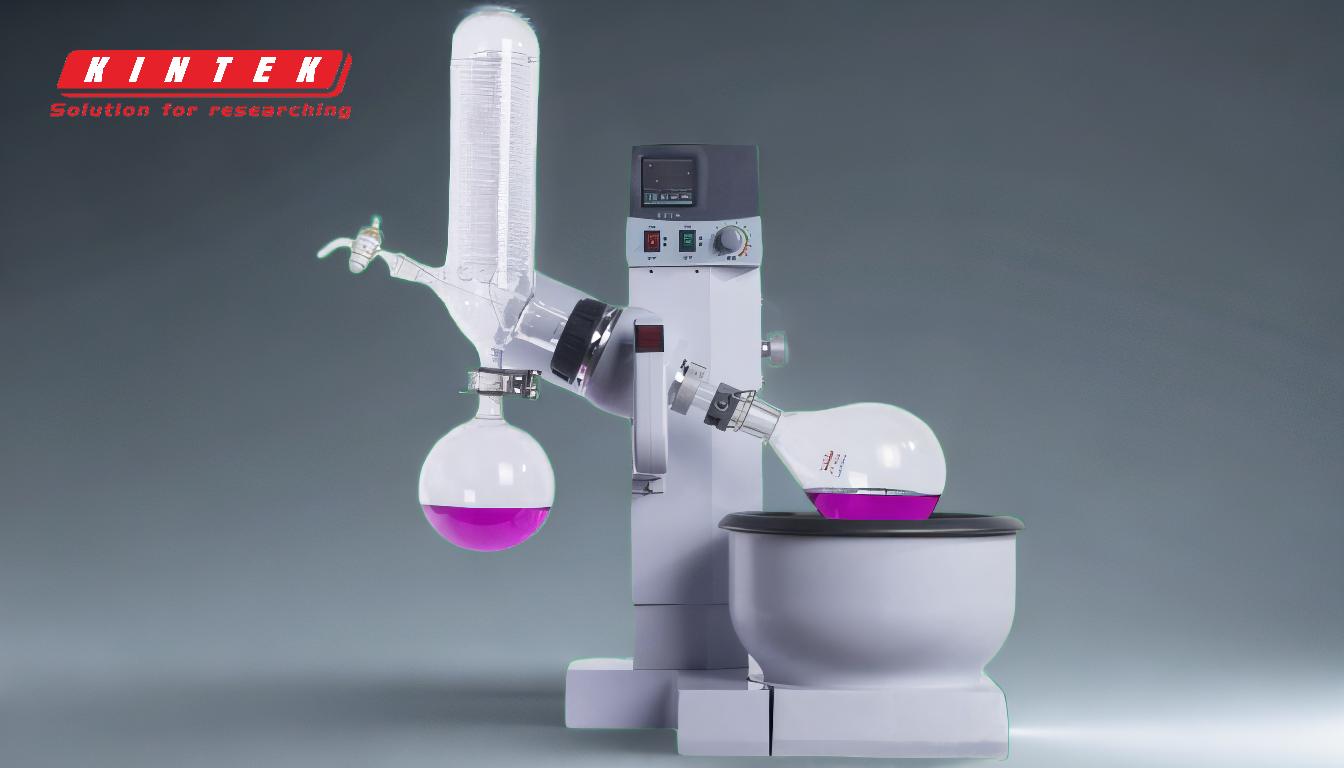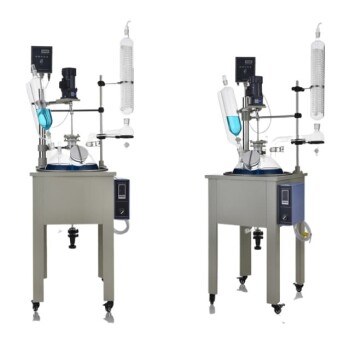A rotary evaporator is a versatile laboratory instrument primarily used for the gentle and efficient removal of volatile solvents from samples under reduced pressure. It is widely employed in various fields, including chemical, pharmaceutical, biopharmaceutical, and biological research, for applications such as concentration, crystallization, drying, separation, solvent recovery, and purification. Additionally, it is used in organic laboratories, medicinal chemistry, chromatography, petrochemicals, and even molecular cooking and gastronomy. The rotary evaporator is particularly valuable for handling heat-sensitive materials, ensuring the preservation of temperature-sensitive compounds during processes like the extraction of plant extracts, essential oils, and CBD, as well as the distillation of complex mixtures.
Key Points Explained:

-
Distillation of Volatile Solvents:
- Rotary evaporators are primarily used for the continuous distillation of volatile solvents under reduced pressure. This process is crucial in chemical, industrial, and biological medicine fields, where the separation of solvents from mixtures is required.
- The reduced pressure lowers the boiling point of the solvent, allowing for gentle evaporation without exposing the sample to high temperatures, which is particularly important for heat-sensitive compounds.
-
Concentration and Purification:
- The rotary evaporator is extensively used for concentrating solutions by evaporating the solvent, leaving behind a more concentrated sample. This is essential in pharmaceutical and biopharmaceutical industries for the purification of biological products that may decompose or degenerate under high temperatures.
- It is also used for the purification of plant extracts, essential oils, and other natural products, ensuring the retention of volatile aromatics and active compounds.
-
Crystallization:
- Rotary evaporators facilitate the crystallization process by slowly removing the solvent from a solution, allowing the solute to crystallize. This is particularly useful in chemical laboratories for obtaining pure crystalline compounds.
-
Drying:
- The instrument is used for drying samples by evaporating the solvent under controlled conditions. This is important in various industries, including pharmaceuticals and biopharmaceuticals, where dry, solvent-free samples are required for further processing or analysis.
-
Separation and Solvent Recovery:
- Rotary evaporators are employed for the separation of components in a mixture, especially in the distillation of complex mixtures. They are also used for solvent recovery, which is both cost-effective and environmentally friendly, as it allows for the reuse of solvents in laboratory processes.
-
Chemical Reactions and Mixing:
- In some cases, rotary evaporators are used to facilitate chemical reactions by removing by-products or excess reactants through evaporation. They can also be used for mixing and formulation purposes, ensuring homogeneous mixtures.
-
Applications in Molecular Cooking and Gastronomy:
- Rotary evaporators have found a unique application in molecular cooking and gastronomy, where they are used for non-heat evaporation processes to retain volatile aromatics and create concentrated flavors without compromising the delicate compounds.
-
Extraction of CBD and Other Compounds:
- In the industrial field, rotary evaporators are used for the extraction of CBD from hemp and other plant materials. They are also used in daily life applications, such as extracting water from juices, and in laboratories for extracting chemical substances.
-
Teaching and Research:
- Rotary evaporators are widely used in educational settings for teaching purposes, allowing students to learn about evaporation, distillation, and other laboratory techniques. They are also essential tools in medical and biological research for various experimental procedures.
-
Handling Heat-Sensitive Materials:
- One of the key advantages of rotary evaporators is their ability to handle heat-sensitive materials. By operating under reduced pressure, they minimize the risk of thermal degradation, making them ideal for the purification and concentration of temperature-sensitive biological and chemical compounds.
In summary, the rotary evaporator is an indispensable tool in modern laboratories, offering a wide range of applications across multiple industries. Its ability to perform gentle and efficient solvent removal under reduced pressure makes it particularly valuable for handling heat-sensitive materials, ensuring the integrity of delicate compounds throughout various processes.
Summary Table:
| Application | Key Use |
|---|---|
| Distillation of Solvents | Gentle evaporation of volatile solvents under reduced pressure. |
| Concentration & Purification | Concentrates solutions and purifies heat-sensitive biological products. |
| Crystallization | Facilitates the formation of pure crystalline compounds. |
| Drying | Removes solvents under controlled conditions for dry, solvent-free samples. |
| Solvent Recovery | Recycles solvents for cost-effective and eco-friendly lab processes. |
| Molecular Cooking | Retains volatile aromatics for concentrated flavors in gastronomy. |
| CBD Extraction | Extracts CBD and other compounds from plant materials. |
| Teaching & Research | Essential for educational and experimental procedures in labs. |
Unlock the potential of rotary evaporators for your lab—contact us today to learn more!












